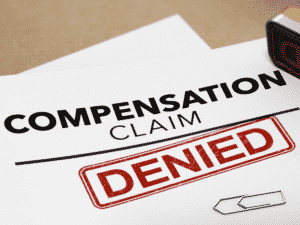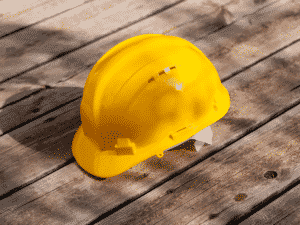What To Do If Your Workers Compensation Claim Is Denied [2023]
If you are injured on the job in California, you may be eligible for workers’ compensation benefits. These benefits can help you cover medical expenses and lost wages while you recover from your injury. But sometimes workers’ compensation claims are denied. That's right. You expect that your claim will be accepted. After all, you are telling the truth and expect you will be treated fairly. But don't get ahead of yourself. Your claim could be denied by the insurance company.
Don't Give Up
If this happens to you, don’t give up – there are steps you can take to appeal the decision and get the benefits you need and deserve. In this blog article we will discuss how to determine if your claim is denied and what to do next if and when it is.
How Do I Know That My Claim Is Denied?
You reported the injury to your employer. Your employer provides you with a claim form to fill out. This is known as the DWC-1 Claim Form. You complete the form, your employer completes their portion, then sends it in to the insurance company. In the meantime, you should receive emergency medical treatment. You are also to be sent to medical treatment within 24 hours. Your first doctor will probably be where your employer sends you at the industrial medical clinic (Concentra).
Written Notice Requirement
If your workers’ compensation claim is denied, you should receive a written notice from the claims administrator. This notice should explain why your claim was denied and what steps you can take to appeal the decision. If you do not receive anything in the mail, then it means your claim is still under investigation. Or, it could mean that your employer didn't report it to the insurance company at all. If you are receiving medical treatment but no temporary disability payments, then your claim is probably “on delay.” Temporary disability payments are not due and owing if the employer is conducting investigation within the first 90-days of learning of the claim.
What “On Delay” Means In California Workers' Compensation
In California, there is a 90-day delay period for workers’ compensation benefits. This means that you will not receive any money benefits for the first 90 days after your injury. Only medical treatment.
A claim is considered “on delay” when the claims administrator needs more information to make a decision on your benefits. This usually happens because the claims administrator did not receive all of the necessary documentation, such as medical reports or wage verification forms. If this is the case, you should receive a letter asking for additional information. Once you provide the requested information, your claim should be either be accepted or denied.
Why Is My Claim Being Denied?
There are several reasons why your claim may have been denied. The most common reason is that the employer or their workers’ compensation insurance carrier does not believe that your injury is work-related. They may also deny your claim if you do not have proper documentation or if you miss the deadline to file a claim.
Disputed Facts Lead to Denial
Another common reason for Denial is that the employer or insurance company disputes your version of events. They may say that you are not injured as badly as you say you are, or that your injury is not work-related. If this happens, it is important to have an experienced attorney on your side who can help you gather the evidence you need to support your claim.
Appealing A Denied Claim
If your claim is denied, you have the right to appeal the decision. You should do this as soon as possible. The appeals process in California workers’ compensation claims can be complex, so it is important to seek the help of an experienced attorney.
An attorney can help you navigate the appeals process and make sure that your rights are protected. They can also help you gather the evidence you need to support your claim, such as medical records and witness statements. Here are some things a lawyer can help accomplish when it comes to a denied workers' compensation claim:
File An Application For Adjudication of Claim at the WCAB
Appeals of workers’ compensation claims are heard at the Workers’ Compensation Appeals Board (WCAB). The WCAB is an administrative law court set up through the executive branch (California Department of Workers' Compensation) under the authority of the legislature and oversight of the judiciary, including the California Supreme Court. The State of California has established several WCAB offices throughout California, so you will need to file your appeal at the office that serves your county.
Workers' Compensation Judge Makes Final Decision
While this is going on, keep in mind that neither your employer nor their insurance has the last word in whether your workers' compensation claim is rejected. The DWC/WCAB judge is the only one who can rule on whether or not your claim will be accepted or denied in the end.
Request a hearing before the Workers’ Compensation Appeals Board (WCAB)
When the DWC has received your Application for Adjudication of Claim, they will send you a Notice of Application confirming receipt. A court case number (starting with ADJ) will be assigned to your case. The ADJ number appears on your notice as well.
A request for a hearing should be made once your case is ready to go to hearing by submitting a Declaration of Readiness to Proceed with the DWC. A workers' compensation lawyer helps you do this.
Help You Obtain A Qualified Medical Evaluation (QME)
A qualified medical expert (QME) may be requested to assist the parties in resolving the problems presented by a disputed diagnosis. If you employ an attorney, he or she and the claims administrator may be able to agree on a medical evaluator (AME) to resolve these types of medical disputes:
- need for ongoing treatment
- need for future medical care
- permanent impairment
- work restrictions
- job retraining
- temporary disability periods
- body parts involved
- cumulative trauma periods
- employer liability
- nature and extent of injury
- industrial causation
The DWC will send the applicant and claims administrator a list of QMEs within their geographic area to choose from. The parties must select someone from this list. If they are unable to agree, each party may strike one name and the remaining QME on the list will be appointed.
An injured worker who is not represented by an attorney has the right to request a QME at any time.
Present your case at the hearing
You need to file a Declaration of Readiness to a Mandatory Settlement Conference (MSC). The WCAB Judge will try to persuade you and the insurance company to negotiate a settlement. If the case does not settle, it will be scheduled for trial and a date for the hearing/trial will be given to the parties.
A Workers' Compensation Judge will preside over the hearing, which will be held in a manner much different than a civil trial. Civil lawsuits include the right to a jury trial. A Workers' Compensation Judge is both the judge and jury. The judge in a workers' compensation case has very narrow power to decide workers' compensation claims only. And civil judges cannot adjudicate a workers' compensation case.
Workers' Compensation Trial
Both sides will provide evidence to the Judge who will preside over the trial, and they will be able to question and cross-examine any witnesses presented in the Pre-Trial Conference Statement, which was completed at the time the case was set for trial by both parties. A court reporter will record everything that is said in the courtroom. The judge will take the case under advisement/submission and make a decision, generally within 30 to 90 days, once both parties have finished.
Negotiate with the claims administrator for a fair settlement.
A workers’ compensation attorney can help you get the benefits you need and deserve. Don’t wait – contact an experienced attorney today. The experienced lawyers at Napolin Accident Injury Lawyer know how to fight for their clients in the arena of workers' compensation benefits disputes.
- A Guide on Red Light Auto Accidents in California - August 14, 2024
- Self-Representing in a California Personal Injury Claim - August 13, 2024
- Common Sources of Distraction for Drivers in California - August 13, 2024



